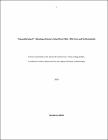| dc.description.abstract | The aim of this thesis is to critique a body of monologue drama by Irish playwrights during the period 1964 to 2016. Building on the recent work of Irish and international scholars on monologue drama and performance, it will seek to add substantially to the discourse on the monologue dramatic form within Irish theatre. Interpreted politically as the voicing of subordinated subjects, the thesis will deploy theories of performativity to read monologue plays as sites of enunciatory resistance in which performances of narrative are understood as performative acts of self-constitution.
The introduction will identify a clear dramaturgical trend in composition and productions of monologue drama from 1964-2016, peaking in the late 1990s and early 2000s. It will identify texts and productions for analysis, lay out the critical lenses of performativity that will support that analysis (Austin, Butler and Sedgwick), and offer an historical account of the theatrical monologue from Greek tragedy to the present day.
Chapter One analyses the monologue drama of Brian Friel, utilising Austinian performativity as a primary critical tool. The magical, constitutory properties of language will be highlighted in Friel?s Philadelphia, Here I Come!, Faith Healer, Dancing at Lughnasa and Molly Sweeney. In the 1960s and 1970s, Friel?s innovative use of monologue demonstrated to playwrights, directors and critics its theatrical potential, setting the scene for later political adoptions of the form.
Chapter Two explores the relationship between theatrical monologue performance and the construction of national identities, beginning with the performative force of the 1916 Proclamation and advancing to a consideration of identities of rural isolation and finally to the conflicted emigrant subjects of the Irish Diaspora. Monologue performances are construed as expressions of desire for inclusion/reinstatement into national narratives, but serve to underline their status as being unintelligible to the dominant script.
Chapter Three examines a body of female-authored monologue drama and how monologic spaces have enabled constructions of female identities but how these same performances may rehabilitate patriarchal hegemonies. Productions of women?s monologue drama have evolved to counter the pitfalls of visibility, embodiment and audibility to produce works resistant to hegemonic recuperation.
Chapter Four situates the performance of key monologue plays, many of which were staged in smaller theatre venues, within a wider Dublin economy of theatre spaces, ranging from established, dominant houses to studio spaces. Countering the strand of performative, discourse-orientated analysis will be a consideration of the material sites of monologue performance and the performer/spectator spatial dynamics of intimate performance spaces within smaller theatre venues.
The conclusion will reflect on the period in which monologue dramatic form was at its height in Ireland and look to the current status of the form in terms of recent productions and formal experiments. The monologue?s lyrical and performative appeals for playwrights and actors help to make it a resilient dramatic form. The conclusion will also examine recent deployments of theories of performativity and how those may benefit critical analysis of monologue theatrical performance. Butler emphasises the unanticipated effects of performative acts, which suggests that reappropriations of monologue plays ? in the form of production changes and revivals ? will ensure that they will retain their singular subversive qualities into the future. | en |




